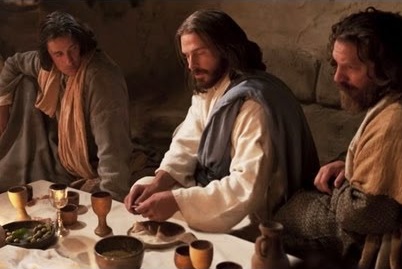Jesus & the Law – on honoring the Passover … (11/26/18)
Passover was one the most important holy festivals in the Jewish Calendar, and as such it made complete sense both that the Law contained dozens of regulations pertaining solely thereto (see Exodus 12:16, Leviticus 23:6-8, & Numbers 9:11 et al) and that Jesus went to great lengths to formulate one of his most intricate legal commentaries thereupon. Indeed, while more than a few scholars wholeheartedly believe that Jesus’ “Last Supper” was not an actual Passover repast, Jesus’ obviously purposeful orchestration of that final communal meal presented an obvious commentary on the Jewish Law (along with a loud call for the radical reform thereof) nonetheless. Consider …
*First & foremost, whereas the Law called for the Passover Seder to commemorate the Jews being spared from God’s incredible wrath (see Exodus 12:1-10), Jesus’ “Last Supper” celebrated the “rebirth” of a very different God – a God of infinite mercy and perfect Love (see Matthew 26:1-2 & the “new covenant” mentioned in Mark 14:24 & Luke 22:20 – along with Matthew 5:48, Luke 6:36, & John 5:22+John 8:15+John 12:47 et al).
*Secondly, whereas the Law demanded quite explicitly that no foodstuffs containing yeast be consumed during the Passover (see Exodus 12:15-20, Exodus 13:3-7, & Deuteronomy 16:3 et al), Jesus and his disciples ate leavened bread at their “Last Supper.”1
*Thirdly, whereas the Law was unequivocal in mandating that a lamb be slaughtered and eaten during the Passover meal (see Exodus 12:6-10, Exodus 12:43-48, Exodus 23:18, & Numbers 9:11-12 et al), Jesus’ “Last Supper” with his disciples contained no such act of slaughter-based cruelty (see Matthew 26, Mark 14, Luke 22, & John 13). Indeed, in place of that lamb, Jesus symbolically offered himself instead (or rather, offered the Truth of his Way of Living – see John 13:15-17+John 14:6, alongside the “my blood” & “my body” he announced in Matthew 26:26-28, Mark 14:22-24, &Luke 22:19-20).
*Finally, whereas the Law proscribed the re-telling of the initial Exodus story at Passover (see Exodus 13:8), Jesus refused to do so – telling his disciples to partake of his bread & wine’s “new covenant” instead, and asking that they do so “in remembrance of me” (see Luke 22:19-20 – a clear & bold reference to God’s promise in Jeremiah 31:35 that His previously wrathful ways would be replaced by merciful ones).

………………………………………………………….
1 NOTE the flagrant contrast between the leavened arton (Strong’s #740) that Jesus and his disciples ate in Matthew 26:26, Mark 14:22, & Luke 22:19 and the unleavened azumos (Strong’s #106) they were traditionally called to eat in Matthew 26:17, Mark 14:12, & Luke 22:7. In addition, while it is true that John 13:25 does use the Greek term for “morsel” (psomion Strong’s #5596) instead of the one for “leavened bread,” an examination of Ruth 2:14 (where the Hebrew equivalent of that same term is also used) shows that even John essentially claimed thereby that Jesus did indeed dip leavened bread into the supposedly Paschal Cup.




 ;
;